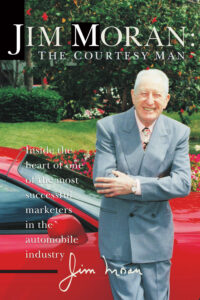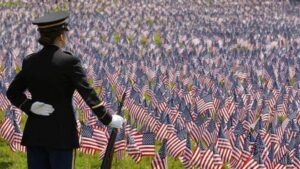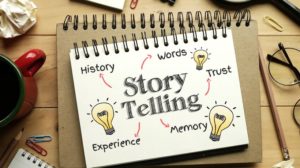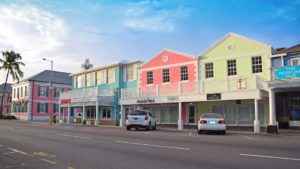
Jim Moran was known as “The Courtesy Man.”
I recently had the pleasure of spending a day at JM Family Enterprises in Deerfield Beach.
It was– in a word– amazing.
The campus on Hillsboro Boulevard is spectacular and the company that occupies the grounds is remarkable.
JM Family is in the car business—in a big way. Southeast Toyota and JM Lexus are what the company is famous for, but divisions also work in finance, insurance, franchising, and dealer consultation. JM is a nearly $19 billion a year concern, making it the 17th largest privately held company in America.
JM Family regularly makes “best places” to work lists and it’s easy to see why. The campus is beautiful, the amenities next level. Associates (that’s what employees are called) have access to six onsite physicians, a hair salon, gym, a state-of-the-art cafeteria, massage therapists, their own Starbucks, and great spaces in which to work and mingle. It was impressive. But the amenities-while wonderful– don’t tell the whole story. JM’s most valuable asset is its culture.
I was at JM Family for a business retreat, and we had a chance to hear from President and CEO Brent Burns and Scott Gunnell, the president of the JM&A Group which handles finance, insurance, and consulting.
Both men were passionate about their company’s mission and accomplishments. But what struck me the most was the reverence shown to founder Jim Moran, who built this conglomerate from an initial $360 investment in a gas station into a very special business.
Sitting there listening to Mr. Burns and Mr. Gunnell, I noticed how often they referred to Jim Moran’s values. Mr. Moran’s persona is very much alive on that campus and beyond.
“We do it better,” is the company tagline. The phrase is not meant as a boast but rather a challenge and an aspiration. Those four words serve as a reminder that JM associates can and should do everything better than the competition.
Associates are valued but held accountable. Yes, there are perks galore, but you must produce if you want to stay.
Mr. Moran, as he is known, is everywhere in the building and in the hearts and minds of employees many of whom never met the man. He passed in 2007.
Listening to his values being proudly shared in 2023 by current leadership got me thinking.
South Florida has been blessed by a few “giants”; their businesses, civic, cultural, and philanthropic visions shaped our region and way of life.
JM CEO Burns happened to work for three of these giants: Michael Egan, the founder of Alamo Rent a Car, H. Wayne Huizenga who led Blockbuster, Waste Management and AutoNation and the legendary Moran.
I happened to have worked with (never for) a fourth such business titan: Carl DeSantis, founder of Rexall Sundown, a vitamin company, and a major investor in Celsius, which is revolutionizing the energy drink space.
Carl passed away in August, but he left a legacy that is ever expanding with investments in Tabanero hot sauce (shameless plug; it’s awesome), real estate, restaurants and more. The crown jewel remains Celsius, but Carl’s entrepreneurial energy and boundless aspirations didn’t wane after he achieved success, which he called “winning.” He just moved on to the next idea with enthusiasm and confidence.
I keep returning to the Celsius story, because it’s remarkable.
From humble beginnings in a small office on 4th Avenue in Delray Beach, Celsius grew to become a global juggernaut. Its partnership with Pepsi can be a case study (no pun intended) in how an upstart entrepreneurial brand can work with a legacy company to reach new heights without losing its soul.
We owe Celsius’ very existence to Carl’s vision and willngness to keep going when others would have stopped.
Carl’s legacy at Nova Southeastern University was celebrated last week when a new Entrepreneurial Hall of Fame class was inducted. It was 20 years ago that Mr. D dedicated the funds for the Carl DeSantis Building on the NSU campus in Davie. Today, that building is the hub of a vibrant and growing campus community where South Florida’s next wave of entrepreneurs are learning the skills needed to succeed.
I’ve gotten friendly with Andy Rosman, the wonderful business dean at Nova. That school has truly become an economic engine for our region and our friend Carl played a role that I’m not sure he fully realized.
That’s what standout people do, they create waves and value in unexpected and surprising places.
Thanks to Mr. D’s generosity, we are working in the philanthropic world as well.
We just ended the fiscal year at the Carl Angus DeSantis Foundation where we are investing in a wide array of local, national, and international non-profit organizations that are making a difference.
I think about my friend Carl every day as I navigate my job at his family office in Delray Beach. We are committed, like our friends at JM Family, to keeping Mr. DeSantis’ spirit and values alive.
These special people shape our world and region. They create influence in unexpected places.
I never met Mr. Moran, but two special people working for the Delray Police Department 20 years ago were inspired by his Youth Enrichment Vocational Center in Hollywood. To address a car theft issue in the southwest section of Delray, Johnny Pun and Fred Glass intervened and urged youth in the area to stop stealing cars and instead learn to fix them.
They had success with a few kids at the Moran funded Youth Enrichment Vocational Center and decided to start their own school. Inspired by Mr. Moran, the Delray Beach police became the first department in Florida to charter its own school. That’s a part of Jim Moran’s legacy. Those are the waves I’m referring to.
I sure wish I had met Mr. Moran. I did meet Mr. Huizenga at a few business events over the years. He changed the Fort Lauderdale skyline and helped to turn that city from a Spring Break oasis to a business hub.
There are other big players who really shaped our region. The late Alex Dreyfoos played a major role in bringing the cultural arts to Palm Beach County and former Delray Mayor Tom Lynch, owner of a large insurance brokerage, created the template for how a successful business leader can bring those skills to local government. He played a key role in Delray’s renaissance, was a remarkable School Board chair and was influential on the Business Development Board of Palm Beach County among many other things.
It’s critical that we understand the legacy of those who came before us so we can navigate the future.
Last week, I mentioned that I was a has-been. I caught some flak from friends for that remark. So let me qualify that sentiment.
First, it is better to be a has-been than a “never was”, but I wholeheartedly agree that those who are retired, doing other things with their lives, or even deceased have a lot to teach us.
Let’s face it, this world is a mess. It wasn’t always like this and there are examples of people who came before us who knew how to get things done. The best ones did it with class, kindness, hard work, vision, guts, and empathy. They had ethics, took the long view and tried to move the big rocks.
They dared to dream big things and as a result big things happened.
I saw a glimpse of the power of that kind of leadership at JM Family, and I lived it with my friend Carl DeSantis. And I saw it in my adopted hometown of Delray Beach too. And for that, I am grateful. Eternally grateful.







